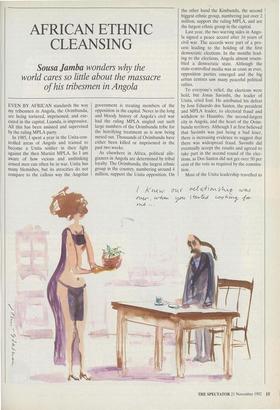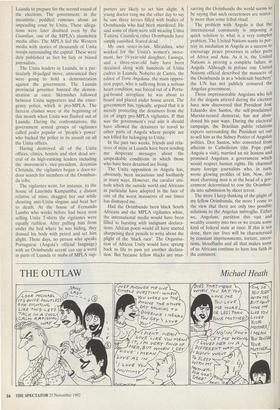AFRICAN ETHNIC CLEANSING
Sousa Jamba wonders why the world cares so little about the massacre of his tribesmen in Angola
EVEN BY AFRICAN standards the way my tribesmen in Angola, the Ovimbundu, are being tortured, imprisoned, and exe- cuted in the capital, Luanda, is impressive. All this has been assisted and supervised by the ruling MPLA party.
In 1985, I spent a year in the Unita-con- trolled areas of Angola and trained to become a Unita soldier in their fight against the then Marxist MPLA. So I am aware of how vicious and unthinking armed men can often be in war. Unita has many blemishes, but its atrocities do not compare to the 'callous way the Angolan government is treating members of the opposition in the capital. Never in the long and bloody history of Angola's civil war had the ruling MPLA singled out such large numbers of the Ovimbundu tribe for the horrifying treatment as is now being meted out. Thousands of Ovimbundu have either been killed or imprisoned in the past two weeks.
As elsewhere in Africa, political alle- giances in Angola are determined by tribal loyalty. The Ovimbundu, the largest ethnic group in the country, numbering around 4 million, support the Unita opposition. On the other hand the Kimbundu, the second biggest ethnic group, numbering just over 2 million, support the ruling MPLA, and are the largest ethnic group in the capital.
Last year, the two warring sides in Ango- la signed a peace accord after 16 years of civil war. The accords were part of a pro- cess leading to the holding of the first democratic elections. In the months lead- ing to the elections, Angola almost resem- bled a democratic state. Although the state-controlled media was as crass as ever, opposition parties emerged and the big urban centres saw many peaceful political rallies.
To everyone's relief, the elections were held, but Jonas Savimbi, the leader of Unita, cried foul. He attributed his defeat by Jose Eduardo dos Santos, the president and MPLA leader, to electoral fraud and withdrew to Huambo, the second-largest city in Angola, and the heart of the Ovim- bundu territory. Although I at first believed that Savimbi was just being a bad loser, there is increasing evidence to suggest that there was widespread fraud. Savimbi did eventually accept the results and agreed to take part in the second round of the elec- tions, as Dos Santos did not get over 50 per cent of the vote as required by the constitu- tion.
Most of the Unita leadership travelled to Luanda to prepare for the second round of the elections. The government, in the meantime, peddled rumours about an impending coup by Unita. These allega- tions were later doubted even by the Guardian, one of the MPLA's staunchest media allies. The MPLA fed the Western media with stories of thousands of Unita troops surrounding the capital. These were duly published as fact by lazy or biased journalists.
The Unita leaders in Luanda, in a par- ticularly ill-judged move, announced they were going to hold a demonstration against the government. The Luanda provincial governor banned the demon- stration at once. Skirmishes followed between Unita supporters and the emer- gency police, which is pro-MPLA. The fiercest clashes were at the beginning of this month when Unita was flushed out of Luanda. During the confrontations, the government armed groups of vigilantes called poder popular or 'people's power' who backed the police in its assault on all the Unita offices.
Having destroyed all of the Unita offices, clinics, hostels and shot dead sev- eral of its high-ranking leaders including the movement's vice-president, Jeremias Chitunda, the vigilantes began a door-to- door search for members of the Ovimbun- du tribe.
The vigilantes went, for instance, to the house of Laurinda Kampamba, a distant relative of mine, dragged her out while shouting anti-Unita slogans and beat her to death. At the house of Fernando Lumbo who weeks before had been seen selling Unita T-shirts the vigilantes were equally ruthless. After pulling him from under the bed where he was hiding, they doused his body with petrol and set him alight. These days, no person who speaks Portuguese (Angola's official language) with an Ovimbundu accent can say a word in parts of Luanda or mobs of MPLA sup-
porters are likely to set him alight. A young doctor rang me the other day to say he saw three lorries filled with bodies of Ovimbundu who had been murdered. He said some of them were still wearing Unita T-shirts. Countless other Ovimbundu have simply vanished, feared dead.
My own sister-in-law, Miraldina, who worked for the Unita's women's move- ment, her 19-year-old daughter, Lusinga, and a three-year-old baby have been detained along with hundreds of Unita cadres in Luanda. Noberto de Castro, the editor of Terra Angolana, the main opposi- tion paper, who is suffering from a serious heart condition, was forced out of a Portu- gal-bound aeroplane he was about to board and placed under house arrest. The government has, typically, argued that it is merely protecting the detainees from the ire of angry pro-MPLA vigilantes. If that was the government's real aim it should have allowed the detainees to travel to other parts of Angola where people are not killed for belonging to Unita.
In the past two weeks, friends and rela- tives of mine in Luanda have been sending me desperate messages about the unspeakable conditions in which those who have been detained are living.
The Unita opposition in Angola has, obviously, been incautious and foolhardy in many ways. However, the cavalier atti- tude which the outside world and Africans in particular have adopted in the face of one of the worst massacres of our times has dismayed me.
Had the Ovimbundu been black South Africans and the MPLA vigilantes white, the international media would have been filled to bursting with indignant declara- tions. African poets would all have started sharpening their pencils to write about the plight of the 'black race'. The Organisa- tion of African Unity would have sprung back to life to pass yet another declara- tion. But because fellow blacks are mas- sacring the Ovimbundu the world seems to be saying that such occurrences are scarce- ly more than some tribal ritual.
The problem with Angola is that the international community is imposing a quick solution to what is a very complex problem. The United Nations wants to por- tray its mediation in Angola as a success to encourage peace processes in other parts of Africa and Asia. As it is, the United Nations is proving a complete failure in Angola. Although in private one United Nations official described the massacre of the Ovimbundu in as a 'wholesale butchery' the UN has not publicly censured the Angolan government.
Those impressionable Angolans who fell for the slogans uttered during the election have now discovered that President Jose Eduardo dos Santos, the self-proclaimed Marxist-turned democrat, has not aban- doned his past ways. During the electoral campaign, the Brazilian public relations experts surrounding the President set out to sell him as the Sidney Poitier of Angolan politics. Dos Santos, who converted from atheism to Catholicism (the Pope paid Angola a visit), married an air hostess and promised Angolans a government which would respect human rights. He charmed many foreign journalists who, in turn, wrote glowing profiles of him. Now, this most charming man is at the head of a gov- ernment determined to cow the Ovimbun- du into submission by sheer terror. The more I keep thinking of the plight of my fellow Ovimbundu, the more I come to the view that there are only two possible solutions to the Angolan imbroglio. Either we, Angolans, partition this vast and wealthy country into two or we create some kind of federal state at once. If this is not done, then our lives will be characterised by constant imprisonments, torture, execu- tions, bloodbaths and all that makes some of us Africans continue to have less faith in the continent.











































































 Previous page
Previous page